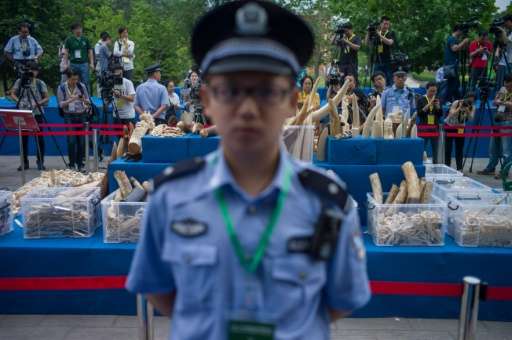China widens ban on ivory imports

China said Tuesday it has widened a ban on ivory imports as it comes under pressure to restrict a trade which sees thousands of African elephants slaughtered every year.
Imports of all ivory and ivory products acquired before 1975 will be banned until the end of the decade, the State Forestry Administration said on its website. The measure came into force on Sunday.
It also extended until the same date existing bans on imports of African ivory carvings acquired after 1975, and all ivory hunting trophies.
China is seen as the major source of demand for African ivory, with prices for a kilogram (2.2 pounds) reaching as much as $1,100.
Conservationists estimate that more than 20,000 elephants were killed for their ivory last year, with similar tolls in previous years. The WWF campaign group says 470,000 of the animals remain.
The Convention on International Trade in Endangered Species of Wild Fauna and Flora (CITES) took effect in 1975. It banned the ivory trade in 1989.
Like other countries, China permits the resale of ivory bought before the 1989 ban—and also has a stockpile purchased with CITES approval in 2008, which it releases for sale with certification.
Activists say the trade in legal ivory acts as a cover for illegal imports and call for a complete ban on sales.
The issue came up during President Xi Jinping's state visit to the US last year, when the White House said in a statement that the two countries "commit to enact nearly complete bans on ivory import and export".
The measures would include "significant and timely" restrictions on hunting trophy imports and steps to halt domestic commercial ivory trade, the statement added.
Beijing imposed a temporary ban on imports of ivory carvings last year, but campaigners described the move as more symbolic than effective.
The Chinese territory of Hong Kong - a key hub for the trade—said in January it would tighten restrictions on ivory imports and exports including a ban on trade in hunting trophies, but did not give a clear timescale.
China's newly extended import bans do not outlaw its existing domestic trade, and appear to potentially allow imports of some raw ivory dating from after 1975.
The State Forestry Administration said imports of ivory artefacts for "teaching and scientific research, cultural exchange, public display and law enforcement" purposes were not covered by the extended ban.
Experts say most illegal ivory is headed for China, where it is seen as a status symbol. By some estimates the country accounts for as much as 70 percent of global demand.
Underlining the scale of the trade, state media reported Monday that police in south China's Guangdong province seized about 450 kilograms of smuggled ivory in a raid earlier this month.
© 2016 AFP




















